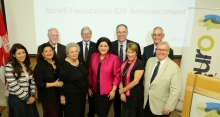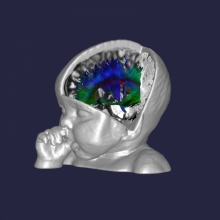A new study by McGill University researchers yields insights into how the disruption of calcium transport in the brain is linked to autism and intellectual disability. The findings, published in the journal Nature, not only upend a long-held belief among neuroscientists, but could pave the way for treatments.


Scientists argue the criteria we use for diagnosing autism may need revision
Without clear and effective biological tests for autism based on genes, brain or blood measurements, diagnosis today still largely depends on clinical assessment. The standard way of doing this is by observing how the individual fits the criteria for autism listed in gold standard manuals like the Diagnostic and Statistical Manual of Mental Disorders, Fifth Edition (DSM-5).

McGill Translational Platform in Autism Research will help uncover the disorders’ neural foundations
A new project at The Neuro, McGill University and the Research Institute of the McGill University Health Centre (RI-MUHC) has been awarded $10.6M in financial support as part of the Canada Foundation for Innovation’s (CFI) Innovation Fund.

Together with Dr. Birgit Frauscher, Bernhardt co-directs The Neuro’s new Centre of Excellence in Epilepsy
Since joining The Neuro in 2016, Boris Bernhardt, PhD, Assistant Professor of Neurology and Neurosurgery, has published pioneering research on the organization and development of the healthy brain. His achievements have been recognized this week by the Canadian Association for Neuroscience, who have awarded him the 2022 New Investigator Award.

To make sense of complex environments, brain waves constantly adapt, compensating for drastically different sound and vision processing speeds
Every high-school physics student learns that sound and light travel at very different speeds. If the brain did not account for this difference, it would be much harder for us to tell where sounds came from, and how they are related to what we see.
TORONTO, Feb. 4, 2021 /CNW/ - Diamond Therapeutics Inc. ("Diamond"), a leading psychedelic drug development company focused on low-dose therapies for mental health, has entered into an agreement with McGill University for the exclusive use of Dr. Gabriella Gobbi's groundbreaking studies with lysergic acid diethylamide (LSD), its mechanism of action on the brain, and its potential for use at low doses in the treatment of mental health disorders.

Q1K: A collaborative undertaking involving 1,000 families to transform autism care

Engaging in musical activities such as singing and playing instruments in one-on-one therapy can improve autistic children’s social communication skills, improve their family’s quality of life, as well as increased brain connectivity in key networks, according to researchers at Université de Montréal and McGill University.

In a study published in Stem Cell Reports, a McGill University team of scientists led by Dr. Carl Ernst, researcher at the Douglas Hospital Research Centre, revealed a molecular mechanism that may play a role in the development of autism.
By taking skin cells from patients and reprogramming those cells to become brain cells through genetic engineering, Dr. Ernst, graduate student Scott Bell, and Edward A. Fon and Thomas M. Durcan, colleagues at the Montreal Neurological Institute and Hospital, tracked how a brain cell with the patient’s own mutation develops improperly.

Montreal — In a study published in Stem Cell Reports, a McGill team of scientists led by Dr. Carl Ernst, researcher at the Douglas Hospital Research Centre, revealed a molecular mechanism that may play a role in the development of autism.

Djavad Mowafaghian Foundation shares The Neuro’s open science vision to accelerate drug discovery and find new and effective treatments for autism spectrum disorders

The Azrieli Centre for Autism Research will foster innovations in therapy and a better understanding of Autism Spectrum Disorder.
A new research centre in Montreal will help lift the shroud of mystery surrounding autism spectrum disorder (ASD), and lead to the development of better diagnostic tools and more effective therapies for people with autism.

A new research centre in Montreal will help lift the shroud of mystery surrounding autism spectrum disorder (ASD), and lead to the development of better diagnostic tools and more effective therapies for people with autism.


Abnormalities shown to first appear in brain networks involved in sensory processing
The origins of autism remain mysterious. What areas of the brain are involved, and when do the first signs appear? New findings published in Biological Psychiatry brings us closer to understanding the pathology of autism, and the point at which it begins to take shape in the human brain. Such knowledge will allow earlier interventions in the future and better outcomes for autistic children.
